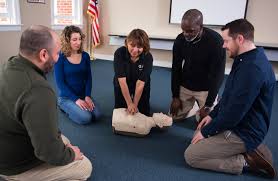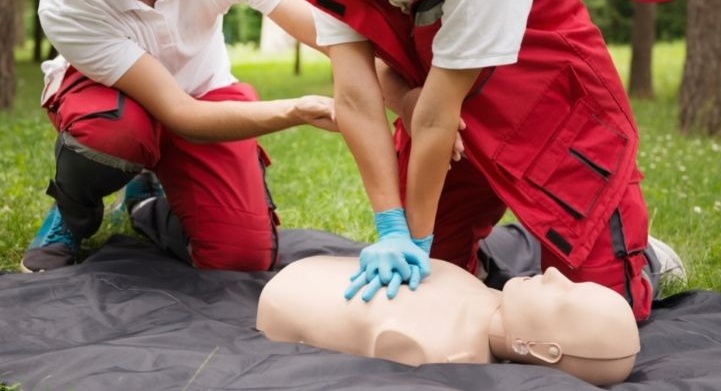Introduction: Comprehending the Relevance of First Aid Courses
First help programs are vital for any individual seeking to equip themselves with life-saving abilities. Whether you are a moms and dad, educator, caregiver, or just an interested individual, knowing first aid can make all the difference in emergency situations. However, there are lots of myths surrounding these programs that may deter people from enlisting. This post intends to disprove these misunderstandings and supply clarity on what first aid and mouth-to-mouth resuscitation courses absolutely entail.
What is an Emergency treatment Course?
A first help course is a training program developed to teach people how to respond efficiently to medical emergency situations. These courses cover a Child Care First Aid Course Near Me selection of subjects consisting of CPR (Cardiopulmonary Resuscitation), injury treatment, choking relief, and therapy for burns and fractures. Participants usually discover via hands-on practice alongside academic expertise, allowing them to acquire self-confidence when confronted with real-life scenarios.
The Relevance of mouth-to-mouth resuscitation in Emergency Treatment Training
CPR is among one of the most critical parts educated in first aid programs. The capacity to carry out mouth-to-mouth resuscitation effectively can suggest the distinction in between life and death for a person experiencing heart attack. In a lot of emergency treatment and CPR programs, individuals are educated on the appropriate methods for grown-up, child, and infant mouth-to-mouth resuscitation. Additionally, they learn just how to make use of computerized outside defibrillators (AEDs), which can considerably boost survival prices if utilized promptly.
Top Misconceptions Regarding Emergency treatment Courses Debunked
Myth 1: First Aid Courses Are Just for Health care Professionals
One usual misunderstanding is that just healthcare specialists need to take first aid programs. This could not be further from the reality!

Why Everybody Need to Consider Taking a First Aid Course
Anyone can benefit from learning standard first aid skills despite their occupation. Emergencies occur all over-- in homes, colleges, work environments, and public spaces-- and having actually trained people offered can conserve lives.
Myth 2: You Required to Be Physically Fit to Take a CPR Course
Many individuals think that being healthy is a requirement for taking mouth-to-mouth resuscitation programs.
Reality Inspect: No Physical Fitness Degree Required
In truth, these training courses are created for all physical fitness degrees. While some physical jobs might be involved (such as executing chest compressions), instructors adjust training techniques so everybody can get involved fully.
Myth 3: Emergency treatment Training Is Too Made Complex to Understand
Another myth focuses on the perception that first aid training is too intricate or technical.
Simplifying Complicated Procedures
First help training courses use simple language and sensible presentations that make discovering obtainable for everyone. Many people locate they can understand the ideas with family member simplicity after just a few hours of training.
Myth 4: Certification Is Just Essential for sure Professions
Some people assume that getting a first aid certificate is just beneficial if you operate in specific areas like medical care or education.
Certification Matters Throughout All Fields
In truth, many companies throughout various industries favor or need employees to have current first aid accreditations as part of their work environment security protocols.
Myth 5: Once Trained, You Don't Need Refreshers
People typically believe that when they've completed their training, they're established for life!
Lifelong Knowing Is Key
However, medical recommendations and procedures progress in time. Routine correspondence course guarantee your abilities remain up-to-date-- ideally every 2 years-- to maintain your first help certificate status.
Myth 6: Online Training Is Equally As Efficient as In-Person Training
With online learning obtaining appeal, numerous assume it gives an equivalent degree of education contrasted to in-person classes.
Hands-On Practice Trumps Screen Time
While online resources use useful information, nothing defeats hands-on practice offered by qualified instructors during in-person sessions where you can engage with equipment like AEDs and technique techniques on mannequins.
Key Components of Emergency treatment Courses
Understanding Different Types of First Aid Rushes Available
When it involves choosing a first help course, you'll discover different offerings customized for various demands:
- Basic Life Assistance (BLS) Pediatric First Aid Wilderness First Aid Workplace Security Training
Each type emphasizes unique content based upon the setting where skills could be applied.

Importance of Hands-On Method in Learning Mouth-to-mouth Resuscitation Techniques
Why Practical Experience Issues Greater Than Concept Alone?
One major facet that establishes effective emergency treatment programs apart is the hands-on experience they use individuals. Involving directly with resuscitation methods enables learners not just to comprehend yet also retain critical information much better than through talks alone.
How Lengthy Does It Take To Complete a First Aid Course?
Typical Period Ranges Based on Qualification Type
Generally talking:
- Basic first-aid training may take anywhere from 4-8 hours. Comprehensive programs like First Aid and mouth-to-mouth resuscitation course might last approximately 16-20 hours over numerous days.
The duration typically depends upon certification requirements or organizational needs.
What Is Covered in a Typical First Aid Course?
Key Topics Normally Included
Recognizing emergencies Assessing victims' conditions Performing CPR Using AEDs Treating wounds & & burns Managing choking incidentsThese foundational subjects prepare individuals for various emergency circumstances they'll likely encounter throughout life.
FAQs Regarding Emergency treatment Courses
FAQ 1: What need to I bring to my emergency treatment course?
Most training courses give equipment; however, bringing individual note-taking products can help improve your understanding during sessions.
FAQ 2: How typically need to I restore my certification?
Typically every two years is advised; this ensures you're updated on any type of modifications in standards or treatments within first-aid practices.
FAQ 3: Can I get my certification online?
While some parts might be completed online (like theory), sensible abilities have to usually be demonstrated in person under guidance before accreditation is granted.
FAQ 4: Do I need previous experience before enrolling?
No prior experience necessary! Most beginner-level courses welcome those with no background expertise whatsoever; they're developed especially for newcomers!
FAQ 5: What impact does discovering first-aid have at my workplace?
Having licensed personnel fosters a setting where security comes to be prioritized-- it equips co-workers with important skills leading towards quicker responsiveness throughout unexpected events!
FAQ 6: Are there special factors to consider relating to kids's security when learning about pediatric-first-aid?
Absolutely! Pediatric-specific programs focus greatly on age-related nuances making sure caregivers feel great reacting properly when faced with emergency situations including infants/children!
Conclusion
Understanding the top myths regarding first aid courses aids demystify this crucial training while motivating extensive involvement throughout demographics who could or else shy away due mistaken beliefs! Not just does finishing such programs encourage individuals within neighborhoods-- they likewise cultivate more secure settings with boosted recognition paired with preparedness First Aid Course among citizens almost everywhere making every effort in the direction of enhanced health and wellness outcomes total! So don't wait-- enlist today right into one of those impactful CPR or other pertinent first-aid-courses!
